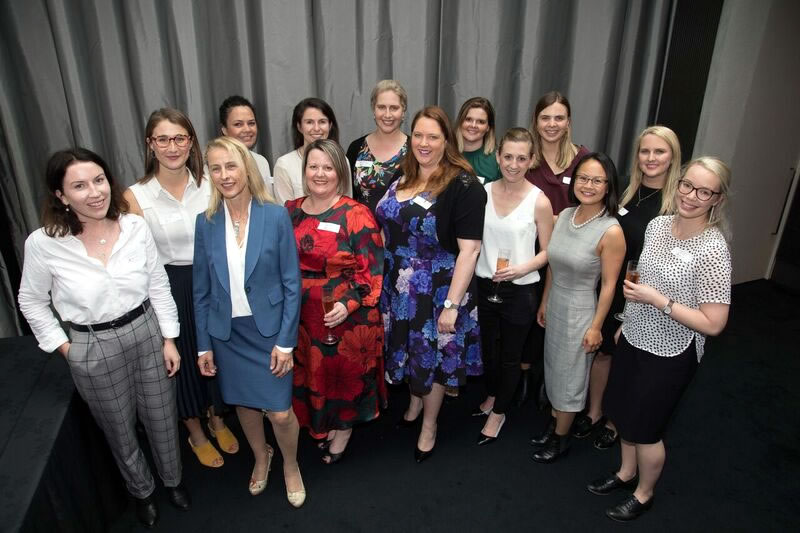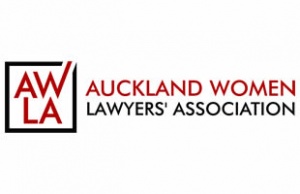The Auckland Women Lawyers’ Association (AWLA) had its first official meeting on 16 April 1984, but its origins go back much earlier. In the 1970s, several significant pieces of legislation affecting women were enacted, including the Contraception, Sterilisation, and Abortion Act; the Equal Pay Act; and amendments to the Electoral Act. In response to this and other societal developments, several women formed the Women and Law Research Foundation, a lobbying and pressure group, to provide research, education and advocacy for women’s legal rights.
Over the next few years there was a shift to making legislation work, preventing regressive amendments, and extending provisions where possible. The Foundation lapsed as an active organisation, but some members stayed in touch. From these informal meet-ups, AWLA was formed as a representative organisation of women involved in the legal profession.
At its first meeting, AWLA decided to ‘gather information, conduct research, advocate women’s interests, and by doing so work for the advancement of women within the [law] profession and society generally’. [1] In May 1985, the membership was 160. [2] From 1985 to the 1990s, the AWLA held monthly social get-togethers, with speakers ranging from women lawyers and judges to politicians and other experts.
A print newsletter (later replaced by a webpage) covered wide-ranging topics, such as childcare and tax deductibility; birth technologies; the Homosexual Law Reform Bill; women partners and career progression; the Cartwright Inquiry; mental health; working women; child abuse; adoption; parental leave; paid maternity leave; employment equity; and equal pay.
Close association with students
From the beginning, AWLA encouraged female law students to be involved. In 1985, AWLA member Margaret Robins commented:
It was very encouraging to see so many students attend [the monthly social event]. The Association is keen to build a strong link between women at Law School and women in the profession, and a get-together such as this one goes a long way to achieving and improving such a link. [3]
Including women students was still a key feature in 2019. As President Alicia Murray stated, ‘It's important to get students involved and on board from an early stage.’ They were catered for with lower membership fees, career evenings, and moot sessions. [4]
Speaking out
AWLA consistently spoke out on matters pertaining to women and the law. In 1988, the President’s Report stated:
One of the reasons why AWLA was originally set up was to operate as an independent organisation – free to move quickly on issues without some of the constraints which might be placed on individual members of the Law Society. [5]
This observation was a reference to an AWLA press statement voicing concern about recent remarks by the Minister of Police which implied that ‘the rise of violent and sexual crime against women was as a result of women somehow losing the respect of some men’. [6]
In 1996, AWLA acted as amicus curiae (‘friend of the court’) for Isabella Ruka in the Court of Appeal. Ruka had been convicted of benefit fraud after the Department of Social Welfare alleged she had continued to receive the Domestic Purposes Benefit while living with a male partner. After an unsuccessful appeal to the High Court, Ruka took her case to the Court of Appeal. AWLA submissions argued that as Ruka had been in an abusive relationship, with no financial interdependence or mental commitment, it was not a ‘relationship in the nature of marriage’; moreover, her partner had threatened to kill her if she left him. The Court of Appeal quashed Ruka’s convictions. [7] Department policy was updated, but subsequent analyses concluded that this change had not been fully effective. [8]
In 2018, the New Zealand Herald asked barrister Catriona MacLennan to comment on the actions of a District Court judge in a case where a man had assaulted his wife, friend and daughter, after discovering his wife and friend were in a relationship. The judge discharged him without conviction, saying: ‘There would be many people who would have done exactly what you did, even though it may be against the law to do so.’ MacLennan said that the discharge and comments ‘displayed a complete lack of understanding of domestic violence, victim blamed, and minimised assaults on three people’. [9]
The New Zealand Law Society’s National Standards Committee (NSC) then began an investigation of MacLennan. a move strongly opposed by AWLA. Vice-President Tracey Fitzgibbon published an open letter to the Law Society, expressing support for MacLennan and concern at the way the investigation was being conducted. Other groups, such as the New Zealand Bar Association, also spoke out, and the NSC decided not to take the investigation further. [10]
Research and education
The AWLA was committed to undertaking and disseminating relevant research. In 2014, it commissioned the Gender and Diversity Research Group at Auckland University of Technology to research the dearth of women at senior levels in large Auckland law firms. The resulting report collated responses from 144 interviewees, below and above the ‘partnership line’, from these firms, and examined the perceived impacts of gender on promotion. [11]
AWLA also set up forums on relevant legal topics. On 10 March 2016, for example, it held a Criminal Justice Forum to discuss the government’s public discussion document, ‘Strengthening New Zealand’s legislative response to family violence’. [12] The general theme was that domestic violence is a multifaceted problem requiring a multifaceted solution.
Keeping up to date
In the late 2010s, AWLA was working to be more inclusive of lawyers outside the central city, responding to criticism that it focused too much on the CBD. In 2018, for example, it ran an event in south Auckland in conjunction with the Manukau law firm Kayes Fletcher Walker.

AWLA
The 2018 AWLA Committee at their Christmas Dinner, with President Alicia Murray fourth from left in the front row.
Speaking in 2019, President Alicia Murray noted the challenge for AWLA of sometimes needing to be critical of the law profession while working inside it, citing the example of the Me Too movement and allegations of misconduct at several New Zealand law firms. She stressed that ‘You have to work within the profession to change it, rather than sit outside and call it out – but it can be a difficult line to tread.’ [13]
AWLA continued to offer significant benefits for members, including networking events throughout the year; events on particular topics, such as career pathways and pay negotiations; the annual Dame Silvia Cartwright lecture; a mentoring service; and advocacy for women in the profession. Murray pointed out that AWLA had been:
started by a group of women lawyers who identified a need at the time within the profession to have a group that provided networking opportunities for women and a kind of safe space for women to advance the progression of … women lawyers. Obviously, we've still got some way to go in terms of equality of representation at senior levels in the profession and that was even more so in 1984. [14]
Kate Jordan
Notes
[1] ‘Minutes of the public meeting 16.4.84’, quoted in AWLA Newsletter, June 1985.
[2] AWLA Newsletter, June 1985.
[3] AWLA Newsletter, April 1985.
[4] Murray, 2019.
[5] AWLA Newsletter, July 1988.
[6] Ibid.
[7] Catriona MacLennan, 'Commentary on Ruka v Department of Social Welfare: Defining a Relationship for the Purposes of State Support', in Elisabeth McDonald et al. (eds), Feminist judgements of Aotearoa New Zealand: Te rino: a two-stranded rope, Chapter 6, Hart Publishing, Portland, Oregon, 2017.
[8] Jessica Wiseman, ‘Determining a relationship in the nature of marriage: the impact of Ruka on the Department of Work and Income’s conjugal status policy’, LLB (Hons) dissertation, Victoria University of Wellington, 2000. Available from: https://ojs.victoria.ac.nz/vuwlr/article/view/5858
[9] Catriona MacLennan, ‘Lawyer: I will not be silenced’, Newsroom, 13 April 2018, https://www.newsroom.co.nz/lawyer-i-will-not-be-silenced-on-domestic-violence
[10] ‘Law Society says no further action against Catriona MacLennan for criticising judge’, New Zealand Herald, 15 May 2018, https://www.nzherald.co.nz/nz/news/article.cfm?c_id=1&objectid=12051723
[11] Judith Pringle et al., ‘Women’s career progression in Auckland law firms: Views from the top, views from below’, Gender & Diversity Research Group, AUT, 2014, https://openrepository.aut.ac.nz/bitstream/handle/10292/6968/FINAL%20COPY%20Women%20in%20Auckland%20Law%20electronic.pdf?sequence=2&isAllowed=y
[12] Lawnews, ‘Family violence – Criminal justice experts united in desire for change’, Auckland District Law Society, 8 April 2016, https://www.adls.org.nz/for-the-profession/news-and-opinion/2016/4/8/family-violence-%E2%80%93-criminal-justice-experts-united-in-desire-for-change/
[13] Murray, 2019.
[14] Murray, 2019.
Unpublished sources
Murray, Alicia, AWLA president 2019, interviewed by Kate Jordan, 2019
Published sources
AWLA Newsletter, 1985–1991, Alexander Turnbull Library, Wellington.
Further sources
Auckland Women Lawyers Association website: http://www.awla.org.nz/


Community contributions